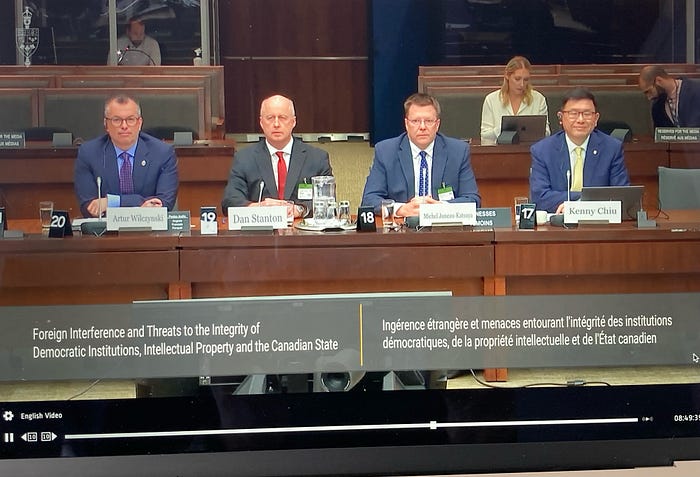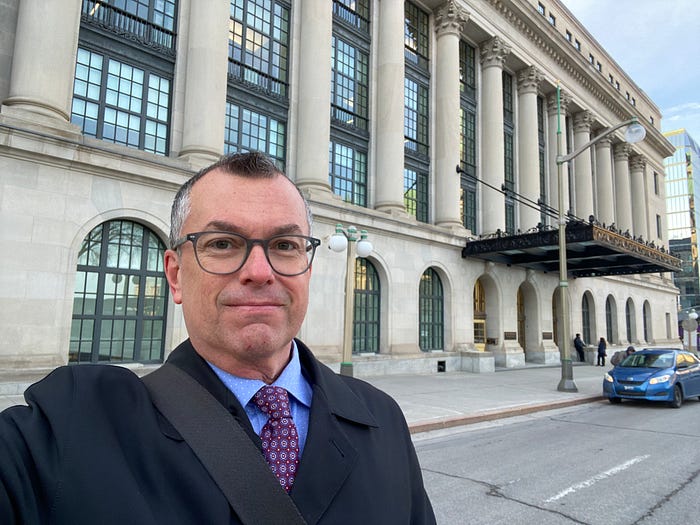Presentation to Parliamentary Committee on Foreign Interference
On Friday March 31st, I had the privilege to speak to the House of Commons Committee on Access to Information, Privacy and Ethics as part of their study of foreign interference in Canada. This is the text of my opening statement.

Chair, thank you for the opportunity to share my views on the threat of foreign interference, and the need for an effective, informed conversation about Canada’s response.
Over 30 years in the public sector, I have seen how government works from many angles.
As Director General of Border Policy at Public Safety Canada, I negotiated security arrangements with the United States. I served as Director General of Security and Intelligence at what is today Global Affairs, as an Ambassador to a NATO ally — and as Director General of Intelligence Operations at the Communications Security Establishment. I am intimately aware of how Canada’s security and intelligence community operates.
I have been a consumer of intelligence and managed intelligence production. I have done so with a focus on equity, diversity, and inclusion.
The complexity of foreign interference requires us to understand the links between a range of interconnected issues.
Foreign interference by hostile state actors such as the People’s Republic of China, the Putin regime in Russia, and the theocratic leaders in Tehran, is a profound challenge that must be more effectively confronted. The security and intelligence community has been speaking about and responding to this threat for years.
Nevertheless, much more can be done to address this threat.
I am glad that we are having this national conversation on foreign interference. We need to listen to the lived experiences of affected communities.
What is regrettable is how we got here and how this conversation is currently taking place.
The illicit disclosure of intelligence, the minimisation of the threat by some in government and the hyperbolic accusations against government and its institutions has resulted in a toxic environment that has impeded our ability to address the threat.

The effect of the tone and content of the conversation has shaken Canadians’ confidence in our democratic institution. Instead of addressing the complexity of the challenge, the debate has been reduced to soundbites and tweets. It has become a vehicle for partisanship rather than a forum where all of us can work together to confront foreign interference, build resilience in our institutions and restore the shaken confidence in our democracy.
One element that I find deeply problematic is the illicit sharing of classified information from anonymous sources within Canada’s security and intelligence community.
These disclosures may have focused national attention on foreign interference but have also caused profound damage to our efforts to confront the threat and are incompatible with defending democracy.
When Public Servants acquire the ability to access classified intelligence, we are sworn to secrecy. We are obliged to follow the law and a wide range of compliance measures.
We swear an oath of secrecy. Our oath is to Canadians. To violate that oath with little understanding of the predictable consequences of these disclosures is profoundly irresponsible and likely illegal.
While I understand the frustration about the pace of addressing foreign interference, disclosure of classified reports is bad — it’s illegal for a reason.
o Compromises techniques
o Compromises sources and makes them less likely to cooperate in the future
o When a government official leaks intelligence, it undermines human rights of individuals named
- No due Process
- No presumption of innocence
- No ability to effectively defend themselves
o All of this impedes both the specific investigations themselves and the ability to nurture sources in the long run
o It is also fundamentally anti-democratic.
You cannot say you are defending democracy while breaking laws passed by Parliament.
As the former Assistant Deputy Minister for People, Equity, Diversity and Inclusion at CSE, I also know that operational security is of fundamental importance to persons with origins in hostile states. For them it is a matter of personal and family safety. Disclosures affect them directly and profoundly.
Mr. Chair, because of these issues, I have supported calls for a public inquiry. I urge Special Rapporteur Johnston, to call for one quickly. We need an impartial, non-partisan inquiry to retrospectively examine what happened, and ensure we have the tools to keep our democratic institutions resilient in the future.
An inquiry would have the ability to review classified information. It would be able to coordinate with the reviews undertaken by NSIRA and NSICOP. It would be able to make recommendations that address at the totality of the threat — not just what happened in 2019 and 2021.
The threats to our democracy are complex and evolving. Foreign interference and the tools of our adversaries are evolving. We need an inquiry to provide Parliament — our elected representatives — with options on how to respond and ensure that Canadians have confidence that their representatives at all levels of government reflect our popular will.
The only ones benefiting from what is happening now, are the enemies of democracy.







